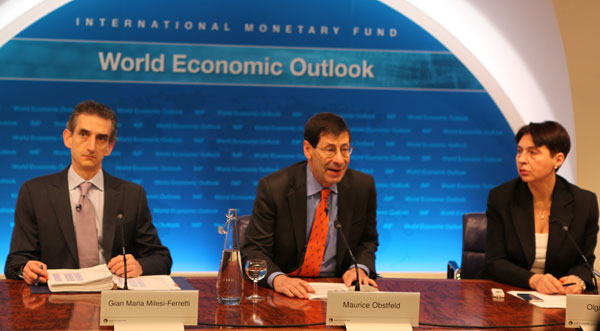 |
|
Maury Obstfeld, IMF Economic Counsellor and Director of Research Department briefs on the World Economic Outlook at the IMF Press Conference in London. [Photo by Wang Mingjie/China Daily] |
"The pickup in global activity is projected to be more gradual than in the October 2015 World Economic Outlook, especially in emerging market and developing economies," the IMF said in its report, issued on Tuesday.
"Risks to the global outlook remain tilted to the downside and relate to ongoing adjustments in the global economy; a generalized slowdown in emerging market economies, China's rebalancing, lower commodity prices and the gradual exit from extraordinarily accommodative market conditions in the United States. If these key challenges are not successfully managed, global growth could be derailed," the IMF added.
"This coming year is going to be a year of great challenges and policymakers should be thinking about short-term resilience and ways they can bolster it, but also about the longer-term growth prospects, ‘' said Maurice Obstfeld, the IMF's Economic Counsellor and Director of Research.
"These long-term actions will actually have positive effects in the short run by increasing confidence and increasing people's faith in the future," he added.
Robert Bergvist, chief economist at SEB, said China was now experiencing a cyclical slowdown, which was coupled with a structural slowdown as the economy became more mature, as the country took steps to become a developed economy.
"China's importance to the global economy and financial markets is growing and we (the rest of the world) must realise that China is an economic superpower. This is good for the world economy but it means also that the problems China will experience in the future will be shared by the many countries. It's also interesting how China will use its chairmanship of the G20 in 2016; This means that Beijing holds considerable sway over the global economic policy agenda this year," he added.
The IMF said China's overall growth was evolving broadly as forecast, although there had been a faster-than-expected slowdown in imports and exports, in part reflecting weaker investment and manufacturing activity.
It also said there were market concerns about China's future economic performance, although the Washington-based body said manufacturing activity and trade remained weak worldwide, not just because of China but also because of subdued demand and a decline in investment in what it called extractive industries.
The dramatic decline in imports in a number of emerging and developing markets also weighed heavily on world trade.
The IMF report, which was written before oil prices fell even further after December, said the plummeting price of oil had strained the fiscal positions of some producing countries; increased expectations of a sustained increase in production by OPEC members was also had an effect.
The report was also written before the lifting of sanctions against Iran, announced this past weekend, which some analysts said would release a further 1 million barrels of crude a year onto the oil markets, further depressing the price.
Risks to be faced included a sharper-than-expected slowdown in China, which would have a knock-on effect on trade, commodity prices and confidence, a further appreciation of the dollar, with tighter financing conditions exposing vulnerability in emerging markets. This could include adverse effects on corporate balance sheets and fund-raising problems for those with high dollar exposure.
The IMF also warned that continuing political tension in various regions would hit global trade, finance flows and tourism.
Bergvist said excess production capacity, weak balance sheets of state enterprises and foreign currency debts will hamper economic growth but added " I don't believe in a hard landing."
The IMF said there were two sides to the decline in the commodity markets; the downside includes a worsening outlook for already-fragile commodity producers, and widening yields on energy sector debt could mean a broader tightening of credit.
The upside, however, means a rapid decline in oil prices may lead to stronger demand in consumer countries that import oil, based in part on perceptions by the consumer that prices will stay lower for longer.
"All in all, there is a lot of uncertainty out there, and I think that contributes to the volatility, and we may be in for a bumpy ride this year, especially in the emerging and developing world," Obstfeld concluded.
"The IMF forecast for Chinese growth is not new or too much out of consensus. The UBS forecast is 6.2 for 2016, and 5.8 for 2017," said Tao Wang, Chief Economist at UBS.
"These forecasts are lower than the likely official growth target of 6.5pct. For us, we think the ongoing property destocking and knock-on effect on the industrial sector will continue to put downward pressure on the economy, which will not likely be fully offset by policy support. In addition, the need to closing `zombie' companies and excess capacity will also mean slower growth. ‘' she said
"Despite this, China at 6.2pct or 6.3pct will still be a top contributor to global growth. One should not be surprised at or emphasize too much at China slowing, since it is already a $10 trillion economy. ‘'
Obstfeld told a press conference in London that China's rebalancing of its economy would have larger spillover effects than previously anticipated.
"Currency management is one area that China's government needs to have more clear communications with the market," Obstfeld told reporters.
The IMF said India and other emerging markets in Asia are expected to continue "at a robust pace" although China's rebalancing and broader global manufacturing weakness may have an effect.
To contact the reporter: chris@mail.chinadailyuk.com
wangmingjie@mail.chinadailyuk.com
